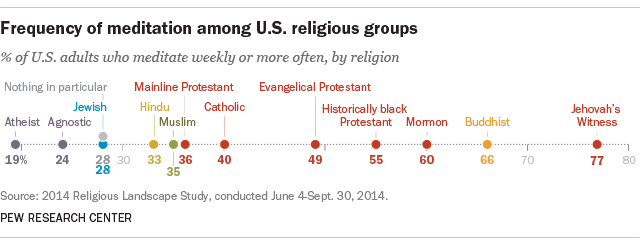
Meditation is Common in Many Religions
- By Alison Lesley --
- 04 Feb 2018 --

Meditation is independent of any religious practice
Unlike popular perception, meditation is not the principal characteristic of Eastern religions alone.[/tweetit] It is a secular activity and found across almost all belief systems.
Meditation is Common in Many Religions[/tweetthis]
Americans of different religions meditate a minimum of one time every week. Researchers at Pew Research discovered about 40 percent of respondents meditate once a week. About 45 percent never do any kind of meditation. Only eight percent mediate twice every month. A measly four percent do multiple times a year. The figure, it should be kept in mind, varies widely among different religious groups in America.
Meditation and religion are different and independent of each other. There is no need to believe in metaphysics to meditate. In fact, meditation becomes better when it is decoupled from religion. Unlike religion, meditation does not mean imaginary, amorphous concepts. The practice wakes people up. Then again, it depends on the individual to believe in religion. If it leads to a better meditation practice, so be it.
The Religious Landscape Study conducted by Pew Research Center in 2014 finds that among all religious groups, Hindus and Buddhists meditate the most. Among the survey respondents, two-thirds told they meditate at least once every week. In contrast, a number of Christians also admit to meditating once every week. When broken up, about 49 percent of the evangelical Protestants, approximately 40 percent of the Catholics, and about 55 percent of black Protestants said they meditate at least once every week. When it came to the smaller Christian groups, the population of people engaged in meditation is higher. About 60 percent of Mormons and about 77 percent of the Jehovah's Witnesses claim to meditate a minimum of one time every week. Both Jehovah's Witnesses and the Mormon Church encourage their followers to meditate.
Meditation is found in mainstream Judaism as well. The word “Qabalah” means both receive and reveal. As per the Judeo philosophy and metaphysical doctrine, the Qabalah tradition makes for a symbolic code created to further the spiritual development of the practitioner. The Qabalah students transform their respective essential inner natures with their essential external Nature. These are done by internalizing the symbols and then absorbing the characteristics via meditation.
Meditation is the source of bliss. It means looking at self. It means self-awakening. It means an interview with self. It means introduction to self. It gives peace, satiation and bliss.
— Osho Siddharth Aulia (@SiddharthAulia) January 4, 2018
Meditation is common in Islam. Sufism is a strain among Islam which draws from a broad range of esoteric traditions like Pythagoras, Zoroastrian, and Hermetic. The rich and deep literary tradition emphasizes allegory, poetry, and symbolism.



















